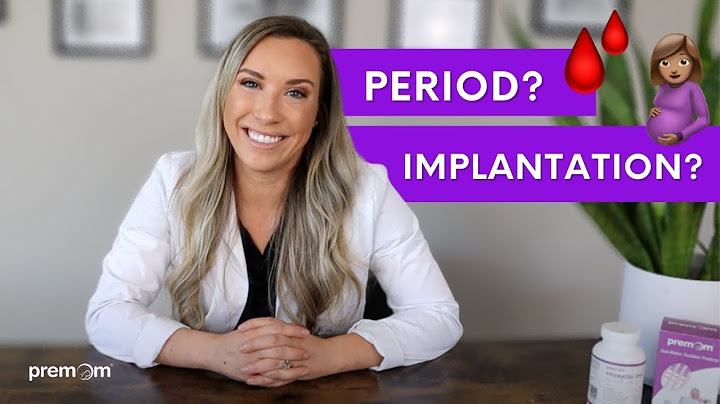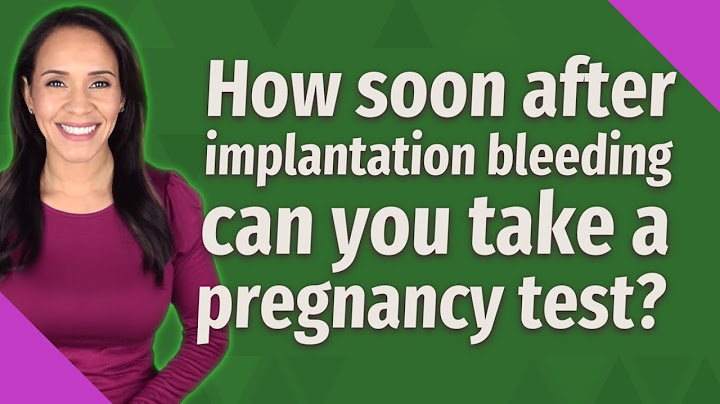Understanding and identifying the signs & symptoms of implantation bleedingYou’re trying for a baby. You’ve done the important ‘making’ part and now it’s a waiting game. A waiting game that probably means you’re keenly looking out for any early signs of pregnancy. Then you spot signs your period might be on its way. Before reaching for a consolation chocolate bar and ordering a new box of ovulation sticks, consider whether it could be implantation bleeding instead. Show
 What is implantation bleeding?Implantation bleeding is an early sign of pregnancy and happens when a fertilised egg attaches itself to the lining of the uterus in order to begin growing. It is completely normal and does not need any medical treatment. It’s thought about one third of women experience implantation bleeding. The difficulty is that it happens at a similar time in your cycle to menstruation, so it’s often confused with having an early period. What are the signs and symptoms of implantation bleeding?
The tricky thing is that most of these symptoms can also be early signs of pregnancy. It’s possible that you’ve been checking your boobs for tenderness and scrutinising your undies since about day 18 of your cycle, so how do you know if this is implantation bleeding or the start of your period? What is the difference between implantation bleeding and a period?There are several key differences between implantation bleeding and menstruation which can help you work out whether you’ve conceived or not.
Are there any times when I should be worried by implantation bleeding?This very early sign of pregnancy is not usually a reason to be concerned; it is perfectly normal and no risk to the developing baby. However, if you are also experiencing symptoms such as, lower abdominal pain, nausea, dizziness or vomiting you should see your doctor as is may be an indication of an ectopic pregnancy. Still not sure? As with a lot of early signs of pregnancy, the only real proof that you’re on the path to parenthood is that all-important line on the pregnancy test. If you think you’ve experienced implantation bleeding, the advice is that you need to wait at least 3 days before taking a home pregnancy test. Before that, there’s unlikely to be enough of the pregnancy hormone hCG to give a positive result. If you can bear to wait 5 days, there’s even more chance it will be accurate. In the meantime keep looking out for other early signs. “I’d never heard of implantation bleeding. I just assumed I had had a slightly lighter period than normal and got back to the job of trying to make a baby. I couldn’t believe it when I got a ‘3weeks+’ reading on a pregnancy test a fortnight later!” When a fertilized egg implants in the uterus, which usually happens 10 to 14 days after conception, it sometimes causes part of the uterine lining to shed. When this occurs, it results in implantation bleeding, which can be one of the earliest signs of pregnancy. But here's the frustrating part: The blood that's released is nearly indistinguishable from normal spotting or breakthrough bleeding that can occur mid-cycle—especially in people who are on birth control pills or have polycystic ovary syndrome (PCOS). The only surefire way to tell the difference is by taking a pregnancy test. "People are so anxious about knowing whether or not they're pregnant, they want to have definitive signs to look for, but unfortunately, only time will tell," says Anuja Vyas, M.D., FACOG, with Houston Methodist Obstetrics and Gynecology Associates. That said, certain symptoms can offer hints that you could be experiencing implantation bleeding rather than period-related spotting. Here, experts share what you need to know. Is It Implantation Bleeding or Period Spotting?Some experts claim spotting that starts brown or wine-colored and becomes a brighter red is most likely the start of your period. But George Patounakis, M.D., Ph.D., FACOG, a fertility specialist in Florida, says Googling pictures won't help if you're wondering if your bleeding is due to implantation. "There's no way to tell the difference between intermenstrual bleeding and implantation bleeding just by looking," he says. To determine whether you have implantation bleeding or your period, you should pay attention to the following three characteristics instead. Symptom #1: CrampingDr. Vyas says that cramping associated with implantation, while sometimes intense, doesn't typically last as long as it would during a menstrual cycle. But Dr. Patounakis cautions that each person experiences uterine contractions differently. "A little blood inside your uterus can cause severe cramps in some women and no cramps in other women," he says. Therefore, paying attention to what feels out of the ordinary for your body is important. Symptom #2: Flow"Some people experience implantation bleeding as heavy as the first day of their menstrual cycle, but it typically only lasts a couple of days," says Jay M. Berman, M.D., FACOG, chief of gynecological services at Detroit Medical Center's Harper Hutzel Hospital and professor of obstetrics and gynecology at Wayne State University. "When it ends, the person may feel like their period is about to start or might have breast tenderness or some nausea and may even start to feel pregnant." Symptom #3: ConsistencyImplantation bleeding can be off-and-on for a couple of days. More consistent blood flow—starting light and getting heavier as the days progress—is likely a menstrual cycle. Should I Take a Pregnancy Test If I'm Spotting?Anyone who's been sexually active in the previous month and could possibly be pregnant should take a pregnancy test after irregular bleeding of any kind, says Dr. Vyas. Keep in mind that implantation bleeding will happen before a missed period. If you experience bleeding that isn't implantation- or period-related (after a positive pregnancy test, for example), it could be what's known as the first trimester bleeding. According to the American College of Obstetricians and Gynecologists (ACOG), this common phenomenon occurs in 15% to 25% of people early in their pregnancy. "But it might also be the first sign of a pregnancy loss or even an ectopic pregnancy," a potentially fatal condition where the embryo implants outside of the uterus, says Dr. Berman. Those who experience abnormal first-trimester bleeding should see a health care provider. "There are pregnancies that bleed early on that do just fine," says Dr. Patounakis, "but your health care provider needs to evaluate to make sure you're safe." Can implantation bleeding start the day of your period?Implantation bleeding is generally light and short, just a few days' worth. It usually occurs 10-14 days after conception, or around the time of your missed period. However, vaginal bleeding has been reported anytime in the first eight weeks of pregnancy. Spotting is also common before the start of a menstrual period.
How many days before your period do you have implantation bleeding?Implantation bleeding tends to occur during the week before you would expect your period, or about six to 12 days after conception. This is around the same time a fertilized egg would be attaching itself to the uterine lining.
|

Related Posts
Advertising
LATEST NEWS
Advertising
Populer
Advertising
About

Copyright © 2024 en.idkuu.com Inc.















